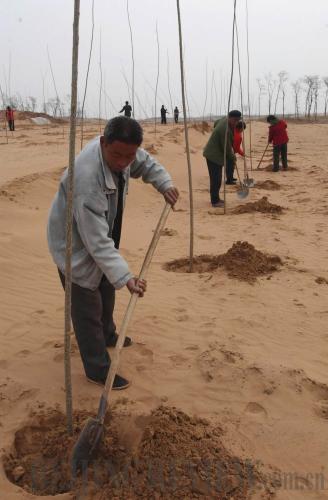|
 |
|
PLANTING TREES FOR PROGRESS: Farmers in Zhongmu County, Henan Province plant trees near the Yellow River. The forestry right reform of collectively owned forestland in China is invigorating the development of the country's forest industry |
Hubei Province farmer Huang Huabing contracted 30 hectares of land from the government for forest farming, the process of establishing and maintaining forests on designated land areas. Although forestlands are owned by the state and rural collectives, a new initiative is allowing farmers, like Huang, to do something they were never allowed to do before—sell the managerial rights of their land.
On October 20, 2009, Enshi Yuhong Wood Products Co. Ltd., based in central China's Hubei Province, signed transaction contracts with 53 forest farmers from Dashanding Village. According to the contracts, the forest farmers received payment for selling the managerial rights of their land while the company acquired about 600 hectares of forestland, its base for raw materials.
Through the transaction, Huang was paid 146,000 yuan ($21,376) for his land.
On November 23, 2009, the China Forestry Exchange (CFEX) was established in Beijing. It is China's first national trading platform for forestry equity and the forest resource market approved by the State Administration for Industry and Commerce. Through the exchange, farmers can sell use rights of their forestland in accordance with the law.
The exchange will actively explore the establishment and improvement of a forest equity transaction system, regulate transactions and build a forest resource-trading platform of international influence. This hints at participation of foreign capital in the forest equity transactions in China, Liang Yu, Chairman of the CFEX Board of Directors, said.
Seeds of change
Only 121 million hectares of China's total land area is cultivated, but forestland covers 287 million hectares. While the Chinese Government began contracting cultivated land to farmers three decades ago, forestland remained under the management of state and rural collectives.
However, such a management mechanism has led to systematic obstacles such as unclear ownership, which has constrained further economic and social development in the forested areas. To alleviate the problem, China adopted forestland use right reform in 2003, allotting the use rights of 170 hectares of collectively owned forestland nationwide to farmers.
Since the reform involves the interests of more than 700 million farmers, it is regarded as another significant change in the rural land contracting mechanism equal in significance with the household contract responsibility system 30 years ago, said Zhang Lei, Director of the Department of Rural Forestry Reform and Development of the State Forestry Administration (SFA).
The first step in the process of collective forestry reform is to clarify land ownership and grant equal contracting rights and collectively owned forestland managerial rights to farmers, while the forest property belongs to the state. Second, farmers should be allowed to freely operate their forestland so that they can reap real benefits and practice their own management styles.
Five provinces—Fujian, Jiangxi, Liao-ning, Yunnan and Zhejiang—have undergone complete reform changes. Another 14 provinces and autonomous regions clarified forestland ownership last year. The forestry departments issued use right certificates to contractors.
The recent establishment of CFEX indicates a deepening in China's forestry reform for collectively owned forestland, which has allowed those farmers with use right certificates to freely transact the managerial rights of the forestland they contracted.
The substantial benefits brought by the transactions have changed the contractors' attitudes toward forestland. In order to obtain the maximum value for their limited land, they are putting more emphasis on tree planting and nurseries.
The afforestation initiative has also experienced considerable progress. At present, China has 62 million hectares of planted forests, ranking first in the world.
Like Enshi Yuhong, many wood product companies have started purchasing forestland. Shandong Chenming Paper Holdings Ltd. recently purchased about 13,300 hectares of forests in Ningyuan County, Hunan Province, expanding its raw material reserves. Now, with nearly 35,000 forest companies in operation, the forestland purchasing frenzy has grown fierce.
Some private companies also hope to tap into the forest tourism industry via this platform. According to the SFA, in 2010, the number of forest parks in China will reach 2,400; the number of forest tourists will reach 300 million; and the comprehensive output of forest tourism will reach 150 billion yuan ($22 billion).
At the opening ceremony for CFEX on November 23, Zhang Jianlong, Deputy Director General of the SFA, said the establishment of the exchange is to promote an orderly transaction of forestland use rights by setting up transaction price and management systems that are open, fair and transparent.
Deep-rooted concerns
As forestry reform takes root, use right transactions will gradually become more active, allowing the market to expand, Zhang said. But many problems still plague the transaction system, including varying standards and services, as well as the failure of government supervision to keep pace.
Li Zupei, a professor at the Center for Rural China Governance at the Huazhong University of Science and Technology, has an intimate understanding of these problems. Months ago, Li carried out a survey on forestry reform in Dongcun Village, Liaoning Province, finding major discrepancies between policies and practice.
In Dongcun Village, there are now 5,867 hectares of forestland, 3,733 hectares of which are state public forests and 2,000 hectares are collectively owned by the village. According to Liaoning's forestry reform policies, all 2,000 hectares should be allotted to households. Since 2006, when the reform was carried out, only 133 hectares have been allotted, less than one 10th of the total forest designated for allotment.
Not all forestland is allotted to farmers due to the reluctance of local forestry departments to abandon their interests—the Central Government grants management fees of 37.5 yuan ($5.49) per hectare of forestland every year, Li said. Moreover, since timber prices have climbed rapidly in recent years, profits from forestland have grown rapidly.
| 